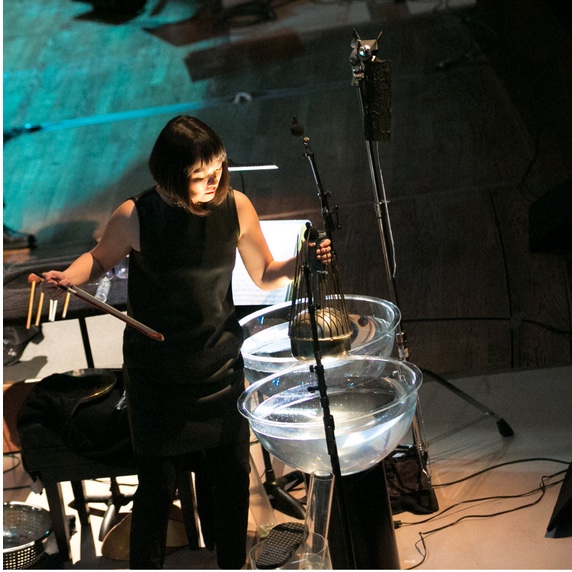by Stephanie Manning

“I play anything that makes noise,” the percussionist says. “Anything that I can make music with—including pure water, to ceramic rice bowls, to anything.”
A specialist in contemporary music, Fujii says she focuses on working with living composers to “innovate and invent the boundary of what the percussionist can do.” Since 2010, she’s been doing just that as a member of the Silkroad Ensemble, a musical collective dedicated to cross-cultural collaboration.
On April 26, she’ll be coming to Oberlin for the first time, as part of the group performing Silkroad’s program “Uplifted Voices.” Tickets are available online.
Fujii will be joined by a collection of people she calls “all my favorite ladies”: Maeve Gilchrist (harp and vocals), Karen Ouzounian (cello), Wu Man (pipa), Nathalie Joachim (flute and vocals), and Pura Fé (lap-steel slide guitar and vocals).
The original idea was to spotlight the female and non-binary voices in the ensemble, but after some brainstorming sessions, the focus expanded beyond just the gender identities of the players. “We wanted to construct the program with not just that, but the voices that we think it’s important to uplift in the world,” Fujii says.
Most of the works were written by the ensemble members themselves and are tied to their own cultural heritage. Karen Ouzounian modeled Der Zor after a Turkish-language tune sung by the victims of the Armenian Genocide, while Pure Fé—who is Tuscarora/Taíno—embraces Indigenous musical traditions in works like Mahkjchi and Canoe Song.
Nasim Khorassani doesn’t perform on the program, but Fujii says they included Khorassani’s piece Lullaby to amplify the Iranian composer’s perspective, “supporting the ladies in Iran who are fighting for their rights.”

While Fujii’s not sure if this specific song was sung in the United States, she says her piece “represents my imagination of the ambition of all these Japanese immigrants who, like me, come from Japan to the U.S. as American dream lands and try to make their own next life.”
The piece premiered during the first tour of “Uplifted Voices” in 2023, when the ensemble visited Connecticut and Virginia. The pre-tour rehearsals were “a wonderful journey of learning about each other,” Fujii says. “Everyone bonded really well, and it’s just so fun to spend time with them, making music and sharing our backgrounds together.”
Although one of the original voices on the 2023 tour—violinist Mazz Swift—couldn’t make it this time around, the Haitian-American flutist Nathalie Joachim will be joining the group as they tour in Ohio, West Virginia, and Arkansas. Fujii says she is “really excited” to share the program with audiences again.
“Uplifted Voices” is part of a larger thematic endeavor for Silkroad spearheaded by artistic director Rhiannon Giddens—who Fujii calls a “genius.” Giddens, who studied voice at Oberlin and graduated in 2000, took over the Silkroad position from founder Yo-Yo Ma in 2020.
Fujii was recently featured in Giddens’ documentary series, “My Music with Rhiannon Giddens,” for an episode set to be aired in May. She talks about Japan’s deep history with the marimba, as well as her own family ties—she and her sister Rika both play, and sometimes they perform together as a duo. The two followed in the footsteps of their mother Mutsuko, who helped pioneer Japanese marimba playing in the 1960s, ’70s and ’80s.
“For me, the marimba is part of the Japanese voice,” Fujii says, adding that she loves sharing the instrument’s history with people outside of Japan. “I really appreciate Rhiannon giving me a chance to tell these interesting stories.”
Now on her 14th year as a member of Silkroad, the percussionist says the spirit of collaboration within the group remains strong. She says the ensemble’s message “is really needed more than ever now—to be really curious about the people outside of your community, and to get to know how they see things and why they do things.”
Being part of the ensemble has also changed her perception of her own music-making, from a vehicle for self-expression into something bigger. Now, she says, “I try to think of music as: how can I connect people? So that’s been an amazing journey that I’m really fortunate to be a part of.”
Published on ClevelandClassical.com April 18, 2024.
Click here for a printable copy of this article



